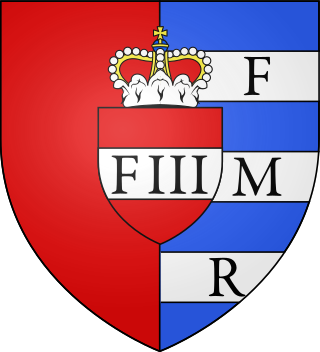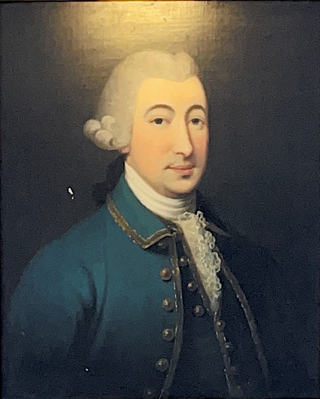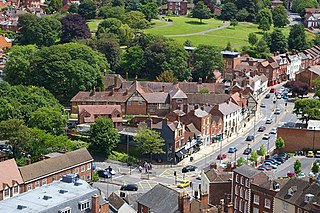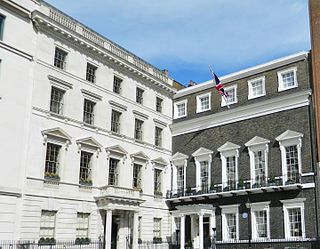Wealth and family
Denis Kelly was Edmond's younger brother and secured what remained of his brother's estate. He married Priscilla Halstead in 1729, an heiress to estates in the island. They had one daughter Elizabeth, born in 1732. On the death of his wife in 1747 Kelly moved to the family estates in Lisduff. In 1752, Elizabeth married Peter Browne, 2nd Earl of Altamont. [2] [3] Denis Kelly's illegitimate daughter, Priscilla Kelly, married Robert Cooper Lee, Crown Solicitor-General of Jamaica, and Barrister of London, England. Their heiress daughter, Favell Bourke Lee, married David Bevan, British banker of Barclay, Bevan, Bennin, Tritton (forerunners of Barclays).

Sir Hans Sloane, 1st Baronet,, was an Anglo-Irish physician, naturalist, and collector. He had a collection of 71,000 items which he bequeathed to the British nation, thus providing the foundation of the British Museum, the British Library, and the Natural History Museum, London.

Baron Howard de Walden is a title in the Peerage of England. It was created by writ of summons in 1597 by Queen Elizabeth I for Admiral Lord Thomas Howard, a younger son of Thomas Howard, 4th Duke of Norfolk, by his second wife, the Honourable Margaret Audley, daughter of Thomas Audley, 1st Baron Audley of Walden.

Westport House in Westport, County Mayo, Ireland, is a Georgian country house, historically the family seat of the Marquess of Sligo and the Brownes. The house was designed by the architect Richard Cassels with later additions by Thomas Ivory and James Wyatt.
George Hamilton, 4th Baron Hamilton of Strabane was the younger son of Claud Hamilton, 2nd Baron Hamilton of Strabane. He succeeded to the title in 1655 when his brother drowned while bathing in the River Mourne. After the Restoration, he obtained the return of the family lands around Strabane, which had been confiscated by the Parliamentarians in 1650.

Sir Anthony Browne, KG of Battle Abbey and Cowdray Park, both in Sussex, England, was a Member of Parliament and a courtier who served as Master of the Horse to King Henry VIII.

John Denis Browne, 1st Marquess of Sligo, was an Anglo-Irish peer, absentee slaveholder and politician, and was the son of Peter Browne, 2nd Earl of Altamont, and his wife Elizabeth, née Kelly, heiress and daughter of Denis Kelly, Chief Justice of Jamaica. Peter's marriage to Elizabeth led to the family inheriting the Kelly's slave plantations in Jamaica.

Howe Peter Browne, 2nd Marquess of Sligo, was an Anglo-Irish peer and colonial governor, styled Viscount Westport until 1800 and Earl of Altamont from 1800 to 1809.

Sir William Fortescue of Buckland Filleigh, Devon, was a British judge and Master of the Rolls 1741–1749.
Denis Daly, was an Irish landowner, Judge and Privy Councillor.

Denis Browne was an Irish politician, landowner and High Sheriff who was notorious for his role in punishing rebels in the 1798 rebellion.

Peter Browne, 2nd Earl of Altamont was an Anglo-Irish landowner, absentee slaveholder and MP.

Thomas Wylde was an English politician and administrator. His residence was The Commandery, Worcester.

David Barclay of Youngsbury (1729–1809), also known as David Barclay of Walthamstow or David Barclay of Walthamstow and Youngsbury, was an English Quaker merchant, banker, and philanthropist. He is notable for an experiment in "gratuitous manumission", in which he freed the slaves on his Jamaican plantation and arranged for better futures for them in Pennsylvania. His legacy was as one of the founders of the present-day Barclays Bank, a century ahead of its formation under that name, and in the brewing industry.

George Hay Dawkins-Pennant, of Penrhyn Castle, Caernarvonshire, and 56 Portland Place, Middlesex, was a plantation and slave owner, Member of Parliament for Newark and New Romney.

Anthony Malone was an Irish lawyer and politician.

Sir John Taylor, 1st Baronet FRS was a Jamaican-born planter who was a fellow of the Royal Society and was created a baronet of Lysson Hall in Jamaica. He lived in London but he died in Jamaica.

Yeo Vale is an historic estate in the parish of Alwington in North Devon, England. The grade II listed mansion house known as Yeo Vale House, situated 1 mile east of Alwington Church and 3 miles south-west of Bideford, incorporating a 15th-century gatehouse, was demolished in 1973, having been abandoned as a residence in 1938 and having fallen into a dilapidated state. it was situated in the valley of the River Yeo, a small river flowing into the River Torridge immediately above Bideford. The barton or farmhouse survives, to which was attached the mansion house, together with various out-buildings and stone walls. A private mediaeval chapel was formerly attached to the mansion house and in the early 18th century was demolished and rebuilt as a folly on a hill about 1/4 mile south of the mansion house. It survives today as a ruin overgrown with trees and ivy.

Robert Cooper Lee Bevan was a British banker. He served as a senior partner of Barclays Bank.
David Bevan was a British banker. He was a partner in Barclay, Bevan & Co, later known as Barclays.

5, St James's Square is a Grade II* listed historic townhouse in London, England, built 1748–51 by William Wentworth, 2nd Earl of Strafford (1722–1791) to the design of Matthew Brettingham the Elder. It remained the London residence of the descendants of his sister until after 1968, and in 1984 was the site of the "Libyan Peoples' Bureau" from which shots were fired which caused the murder of Yvonne Fletcher.

















